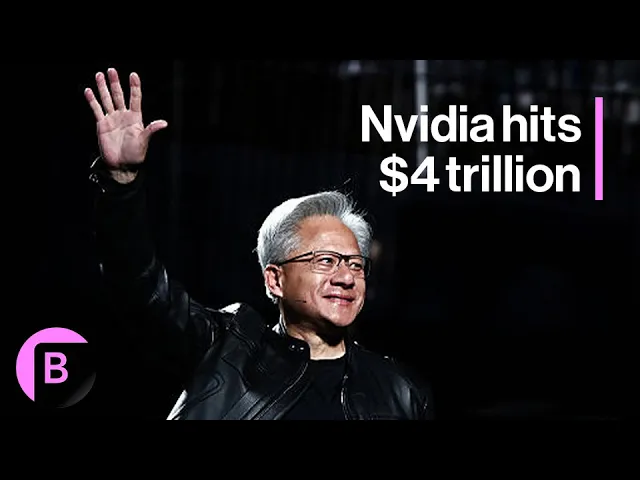Nvidia Hits $4 Trillion Valuation Milestone on AI Demand

Nvidia's $4 trillion valuation reshapes tech landscape
In a striking demonstration of artificial intelligence's transformative power in today's economy, Nvidia has achieved what seemed unthinkable just months ago: a $4 trillion market valuation. This milestone not only cements Nvidia's position alongside tech giants like Apple and Microsoft but signals a fundamental shift in how markets value semiconductor companies in the AI era. The company's meteoric rise reflects both the extraordinary demand for AI infrastructure and investors' belief that we're merely at the beginning of an AI-driven economic revolution.
Key Points
-
Nvidia has reached a $4 trillion market capitalization primarily driven by its dominance in AI chips and infrastructure, experiencing a 700% stock increase since late 2022.
-
Despite trading at roughly 32 times forward sales (compared to the S&P 500's average of 2.7), investors remain bullish on Nvidia's growth potential as AI adoption accelerates across industries.
-
The company's growth is fueled by enterprise-level spending on AI infrastructure, with businesses investing heavily in Nvidia's technology for both immediate applications and future capabilities.
-
Supply constraints have created an unusual economic dynamic where Nvidia's customers are pre-paying and committing to long-term purchases, demonstrating extraordinary confidence in the company's roadmap.
The Power of Ecosystem Dominance
The most compelling aspect of Nvidia's rise isn't just its chip performance but how it has established itself as the essential foundation of the AI ecosystem. Unlike previous tech booms that often featured competing standards and platforms, Nvidia has achieved near-monopoly status in AI computation through its CUDA software platform and specialized hardware. This creates a powerful network effect—as more developers build on Nvidia's platform, the more valuable that platform becomes, creating a self-reinforcing cycle that competitors struggle to break.
This matters tremendously because history shows that controlling the fundamental platform in a technological revolution typically delivers outsized returns. IBM dominated the mainframe era, Microsoft controlled PC software, and Apple mastered the smartphone transition. Nvidia appears positioned to capture similar value from the AI revolution, with the added advantage that AI applications require massive ongoing computational resources rather than one-time purchases.
Beyond the Hype: Real-World Economics
What's often overlooked in discussions about Nvidia's valuation is how
Recent Videos
How To Earn MONEY With Images (No Bullsh*t)
Smart earnings from your image collection In today's digital economy, passive income streams have become increasingly accessible to creators with various skill sets. A recent YouTube video cuts through the hype to explore legitimate ways photographers, designers, and even casual smartphone users can monetize their image collections. The strategies outlined don't rely on unrealistic promises or complicated schemes—instead, they focus on established marketplaces with proven revenue potential for image creators. Key Points Stock photography platforms like Shutterstock, Adobe Stock, and Getty Images remain viable income sources when you understand their specific requirements and optimize your submissions accordingly. Specialized marketplaces focusing...
Oct 3, 2025New SHAPE SHIFTING AI Robot Is Freaking People Out
Liquid robots will change everything In the quiet labs of Carnegie Mellon University, scientists have created something that feels plucked from science fiction—a magnetic slime robot that can transform between liquid and solid states, slipping through tight spaces before reassembling on the other side. This technology, showcased in a recent YouTube video, represents a significant leap beyond traditional robotics into a realm where machines mimic not just animal movements, but their fundamental physical properties. While the internet might be buzzing with dystopian concerns about "shape-shifting terminators," the reality offers far more promising applications that could revolutionize medicine, rescue operations, and...
Oct 3, 2025How To Do Homeless AI Tiktok Trend (Tiktok Homeless AI Tutorial)
AI homeless trend raises ethical concerns In an era where social media trends evolve faster than we can comprehend them, TikTok's "homeless AI" trend has sparked both creative engagement and serious ethical questions. The trend, which involves using AI to transform ordinary photos into images depicting homelessness, has rapidly gained traction across the platform, with creators eagerly jumping on board to showcase their digital transformations. While the technical process is relatively straightforward, the implications of digitally "becoming homeless" for entertainment deserve careful consideration. The video tutorial provides a step-by-step guide on creating these AI-generated images, explaining how users can transform...
